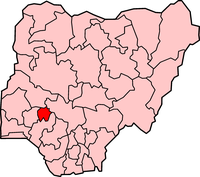Ekiti state is located in the SouthWest geopolitical zone of the Federal republic of Nigeria. The state’s capital is in Ado-Ekiti while other prominent towns within the state include Ado, Ikere Ekiti and Awo Ekiti. Ekiti state has an estimated population of 2, 384, 212 inhabitants spread over 16 local government areas which include Ado Ekiti, Efon, Ekiti East, Ekiti southwest, Ekiti west, Emure, Gbonyin, Ido-osi, Ijero Ekiti, Ikere Ekiti, Ikole, Ilejemeje, Irepodun/Ifelodun, Ise/Orun, Moba, and Oye Ekiti. Ekiti state is regarded as a leading state in Educational development in Nigeria with the state hosting a number of tertiary institutions which include the Afe Babaloloa University Ado Ekiti, College of Education Ikere-Ekiti, Federal University Oye Ekiti, Federal Polytechnic Ado Ekiti, Ekiti state University Ado Ekiti, Crown Polytechnic Ado Ekiti, University of Science and Technology Ifaki, and the Ekiti state School of Nursing. .
Popular landmarks in Ekiti state include the Ikogosi warm spring, the Ikere Ekiti hills, Esa Cave, Ogun Onire site, Olosunta/Oroole, Okemesi/Efon Mountain range, Emure forest reserve, Ewi's Pontiac Car, Igede River source, Eriyan Ekiti Royal Grave site and the Afe Babalola University including rivers ero, ose and ogbese. Christianity and Islam are the most widely practiced religions with a sizeable percentage of the state’s population engaging in traditional religious practices. The Health sector in Ekiti state features a number of hospitals such as the Ekiti state University Teaching Hospital, Federal Teaching Hospital Ido ekiti, St Greg Hospital Ado Ekiti, Federal Medical Center Ido osi, Lifespring Hospital Ado Ekiti, Ade Tade Hospital Ado Ekiti, Ekiti state Specialist Hospital Ijero Ekiti, and the Afolabi Hospital Ado Ekiti.
Ekiti state is home to a number of ethnic groups with members of the Yoruba tribe being the most dominant. Popular festivals held in Ekiti state include the Ogun Onire, Idiroko, Okorobo, Odun Ijesu, Ladunwo masquerade festival, Ijesu Ogun, Uromo, Ekiti Olomi dance festival, Ajabgo dance festival, and the Odun Ifa festival.
The Governor of Ekiti State is Ayo Fayose.
Land of honor and Integrity
Ekiti state has a total area of 6,353km squared and the topography is characterized by the presence of small hills and flat lands which are arable and conducive for crop cultivation and Animal grazing.
Ekiti state is majorly an upland region with an elevation of above 200 meters. The landscape is strewn with metarmorphic rock and generally undulating topography. Ekiti state has several hills which include the Ikere-Ekiti and Ado-Ekiti hills and falls under the tropical savannah climate.
Ekiti state is both an agrarian and commercial state and is known for the cultivation of cocoa, rubber and rice. Trade also flourishes in the state with a number of markets found within its territory. These markets include the Erekesan market Ado Ekiti, Fayose market Ado Ekiti, Owena market Igbara oke, Oja Oba market Ado Ekiti, Oranran market, and the Bisi Ebeyomi market Ado Ekiti.
Also, a number of mineral resources are found in Ekiti state and they include granite, kaolin, columbite, charnockite, iron ore, baryte, aquamine, gemstone, phosphate, limestone, and gold.
Ekiti state was created in 1996 from the old ondo state under the Gen. Sani Abacha regime. History has it that Ekiti state originated from the 14 children of the Olofin and Grandchildren of Oduduwa who settled there after they had gone on an expedition in search of new lands to develop.
Ekiti state has had a number of governors/ administrators since its creation and these include
Mohammed Bawa - 1996-1998
Atanda Yusuf - 1998-1999
Niyi Adebayo - 1999- 2003
Ayo Fayose - 2003- 2006
Tunji Olurin - 2006 - 2007
Segun Oni- 2007- 2010
Kayode Fayemi- 2010- 2014
Ayo Fayose - 2014 - date.
4 based on 0 reviews

Find and explore some of the best businesses in Ekiti State.
© 2025 Manpower Nigeria. All rights reserved.